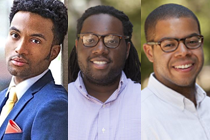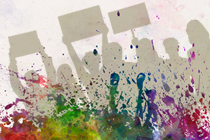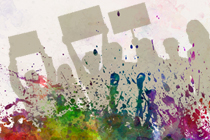Congratulations to ARHU professors La Mar Jurelle Bruce, Julius B. Fleming Jr. and Christopher J. Bonner, who received fellowships for their research projects related to African-American literature, history and culture.
Bruce, Fleming and Bonner were part of an African-Americanist cluster hire, joining a community of scholars at the University of Maryland (UMD) that are at the forefront of the discussion on race and produce scholarship at the intersections of history, literature, gender studies and artistic expression.
La Mar Jurelle Bruce, Assistant Professor in the Department of American Studies
 La Marr Jurelle Bruce was awarded the 2016 Ford Foundation Postdoctoral Fellowship, which is sponsored by the Ford Foundation and administered by the National Academies of Sciences, Engineering and Medicine. He is one of only 21 scholars to receive the postdoctoral fellowship in this year’s rigorous nationwide competition.
La Marr Jurelle Bruce was awarded the 2016 Ford Foundation Postdoctoral Fellowship, which is sponsored by the Ford Foundation and administered by the National Academies of Sciences, Engineering and Medicine. He is one of only 21 scholars to receive the postdoctoral fellowship in this year’s rigorous nationwide competition.
Bruce’s scholarship focuses on “blackness and feeling—that is, the phenomenological, affective, and erotic textures of black life across the diaspora,” Bruce said. “I am especially interested in how feeling informs, inspires, infuses, and sometimes inhibits black expressive cultures,” he added. At UMD, he teaches courses in Africana and American performance, literature, visual art and popular culture.
The fellowship will fund Bruce for the 2016-17 academic year while he completes his first book, “How to Go Mad without Losing Your Mind: Madness, Blackness, and Radical Creativity.” The book is a study of black artists who mobilize “madness” within radical performance and literature. Proposing a theory of madness that addresses its floating signification—and traverses its phenomenological, clinical, sociocultural, and political dimensions—Bruce confronts “the mad” in the work of Charles Mingus, Nina Simone, Amiri Baraka, Ntozake Shange, Patricia J. Williams, Lauryn Hill and Dave Chappelle, among others.
“African American artists have deployed ‘madness’ as content, methodology, metaphor, form, aesthetic and existential posture in an enduring black radical tradition,” Bruce said. “By ‘going mad,’ these artists also expose and convey the violence, chaos, strangeness, wonder, paradox, and danger—in short, the phenomenological madness—that infuses modernity’s racial drama.”
Bruce will be hosted by the Center for Africana Studies and the Department of Music at the University of Pennsylvania in Philadelphia. During his time there, he will be mentored by Guthrie Ramsey, Edmund J. and Louise W. Kahn Term Professor of Music at the University of Pennsylvania.
The Ford Foundation Fellowship Program awards pre-doctoral, dissertation, and postdoctoral scholarships to scholars who promote diversity in the academy.
Julius Fleming Jr., Assistant Professor in the Department of English
 Julius Fleming Jr. was awarded a post-doctoral residential research and teaching fellowship at the Carter G. Woodson Institute at the University of Virginia, where he will be completing his first book manuscript, “Technologies of Liberation: Performance and the Art of Black Political Thought.” In addition, he will begin his second book project, which examines the intersections of race, medicine and capital in black performance and literature—19th century to the present.
Julius Fleming Jr. was awarded a post-doctoral residential research and teaching fellowship at the Carter G. Woodson Institute at the University of Virginia, where he will be completing his first book manuscript, “Technologies of Liberation: Performance and the Art of Black Political Thought.” In addition, he will begin his second book project, which examines the intersections of race, medicine and capital in black performance and literature—19th century to the present.
Fleming specializes in twentieth and twenty-first century African diasporic literatures and cultures, with particular interests in performance, visual culture, sound studies, philosophy and medicine, particularly how they intersect with race, gender and sexuality. He was inspired to pursue his field of research when he was an undergraduate student at Tougaloo College, a private, historically black college in Central Mississippi that served as a bastion for civil rights activism.
The Carter G. Woodson Institute at the University of Virginia funds residencies for scholars who specialize in the study of Africa and the African diaspora. Fleming will be part of the post-doctoral program that offers a two-year research and teaching fellowship.
Christopher Bonner, Assistant Professor in the Department of History
 Christopher Bonner was a 2015-16 recipient of the National Endowment for the Humanities (NEH) Post-Doctoral Fellowship at the Library Company of Philadelphia. The fellowship has enabled him to work on his current book project, “The Price of Citizenship: Black Protest, American Law, and the Shaping of Society, 1827-1868,” which examines the lives of free Africans who were working to define citizenship and secure rights in the decades before the Civil War.
Christopher Bonner was a 2015-16 recipient of the National Endowment for the Humanities (NEH) Post-Doctoral Fellowship at the Library Company of Philadelphia. The fellowship has enabled him to work on his current book project, “The Price of Citizenship: Black Protest, American Law, and the Shaping of Society, 1827-1868,” which examines the lives of free Africans who were working to define citizenship and secure rights in the decades before the Civil War.
Bonner chose to pursue the NEH fellowship in Philadelphia, a city that is considered a center for African American politics before the American Civil War broke out in 1789.
In his book project, Bonner poses questions about how people can change their government and about what black freedom means in a slaveholding society. His ultimate goal, Bonner says, is to shed light on the contributions of black activists before the end of slavery and their role in the creation of the Fourteenth Amendment, which is considered the foundation for citizenship and rights for the modern United States.
“I've been drawn to this work as a way of exploring the long history of struggles for civil rights in the United States,” Bonner said. “I'm also interested in understanding how black Americans have related to and worked to transform the structures of American law and government.”
The NEH Post-Doctoral Fellowship supports scholarship related to United States history and the Atlantic world from the 17th through the 19th centuries. It provides a monthly stipend and access to conduct research in residence at the Library Company of Philadelphia.
About the College of Arts and Humanities
The College of Arts and Humanities has made serious investments in African American culture and history, hiring faculty clusters in African American literature and history, adding to the strong community of African Americanist scholars already spread across the campus’s many colleges. The university is also home to important research centers such as the Consortium on Race, Gender, and Ethnicity and the David C. Driskell Center for the Study of the Visual Arts and Culture of African Americans and the African Diaspora.
Through interdisciplinary collaborations led by the College of Arts and Humanities, UMD is also expanding the breadth of research possibilities in the fields of African American history, literature and culture, and the digital humanities. A new project co-directed by the Arts and Humanities Center for Synergy and the Maryland Institute for Technology in the Humanities (MITH)—“Synergies among Digital Humanities and African American History and Culture”—will utilize digital humanities to develop tools, methods and archives to address African American themed research questions.




 La Marr Jurelle Bruce was awarded the
La Marr Jurelle Bruce was awarded the  Julius Fleming Jr. was awarded a post-doctoral residential research and teaching fellowship at the
Julius Fleming Jr. was awarded a post-doctoral residential research and teaching fellowship at the  Christopher Bonner was a 2015-16 recipient of the National Endowment for the Humanities (NEH) Post-Doctoral Fellowship at the Library Company of Philadelphia. The fellowship has enabled him to work on his current book project, “The Price of Citizenship: Black Protest, American Law, and the Shaping of Society, 1827-1868,” which examines the lives of free Africans who were working to define citizenship and secure rights in the decades before the Civil War.
Christopher Bonner was a 2015-16 recipient of the National Endowment for the Humanities (NEH) Post-Doctoral Fellowship at the Library Company of Philadelphia. The fellowship has enabled him to work on his current book project, “The Price of Citizenship: Black Protest, American Law, and the Shaping of Society, 1827-1868,” which examines the lives of free Africans who were working to define citizenship and secure rights in the decades before the Civil War.










